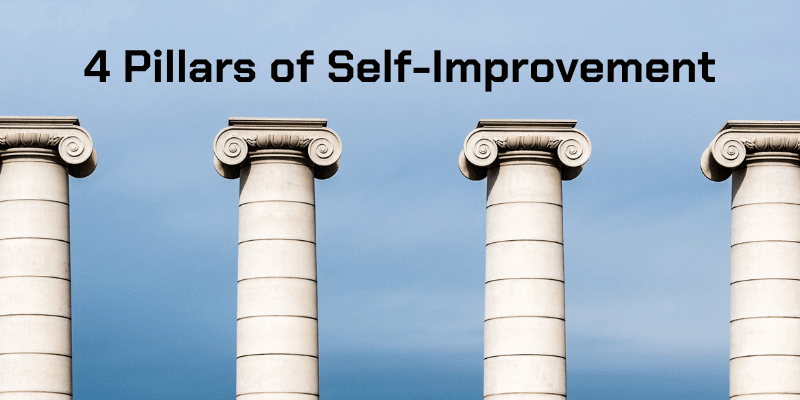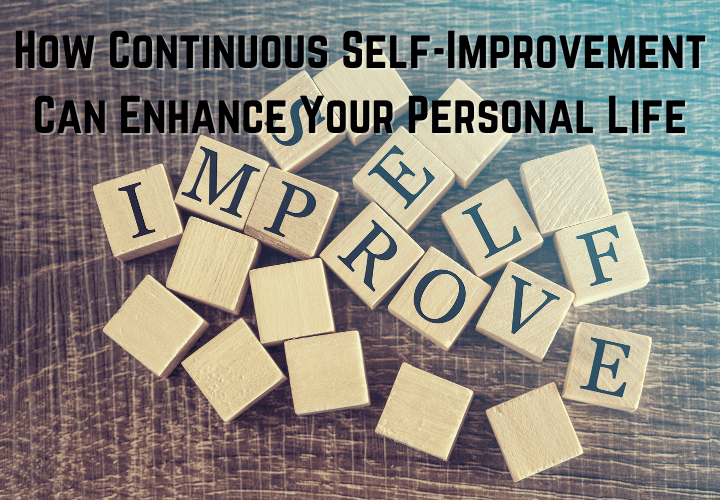Self improvement is a lifelong journey. It is something that we should all be striving to become the best versions of ourselves. Continuous self improvement can enhance every aspect of our lives, including our relationships, careers, and overall happiness. This article will discuss some of the benefits of continuous self improvement and offer tips on getting started on your journey!
What is Continuous Self Improvement, and Why Should You Care?
Continuous self improvement is improving yourself through constant effort and action. It involves reflecting on your current situation, setting goals, and actively making changes to improve any area of your life that you want to improve. Continuous self-improvement is important because it allows you to become the best version of yourself mentally and physically. You become more confident, productive, and motivated when you focus on continuously improving yourself.
Continuous self development is also essential for personal growth; pushing your limits and striving to be the best version of yourself can open new opportunities. Continuous self-improvement will help you gradually lead a healthier and happier life. So make it a priority to constantly push yourself and strive for personal improvement journey in all areas of your life. You won’t regret it!
What Does Kaizen Mean?

Kaizen is a Japanese philosophy that translates to “change for the better.” Toyota Motor used it in the 1940s and 50s as part of their production system. Kaizen is now widely accepted as an approach to improve operational efficiency, reduce waste, and ultimately increase profits. Kaizen culture of continuous improvement approach focuses on the collective effort of all employees. Kaizen principles are based on the idea that small improvements, implemented consistently and cumulatively, can gradually add to significant results.
In Kaizen culture, employees are encouraged to identify problems and develop solutions that benefit the entire organization. Kaizen ensures innovation and increased efficiency within an organization by focusing on continuous improvement.
What are the 4 Pillars of Self-Improvement?

The four pillars are:
1. Physical Health includes exercise, nutrition, and general well-being. Eating nutritious meals, getting enough sleep, and engaging in physical activities can all help to improve your overall physical health.
2. Mental Health: This involves developing strategies for managing stress, improving concentration, learning techniques to cope with negative emotions, and developing positive thinking habits.
3. Financial Health: This involves being aware of your financial situation and securing your future by making smart investments, saving money, and planning for retirement.
4. Spiritual Health: This refers to focusing on self-awareness, mindfulness, personal growth, and finding a meaningful purpose in life. It can also involve exploring spiritual practices such as meditation and connecting with a higher power.
Focusing on these four pillars makes it possible to create an overall plan for consistent and constant improvement that addresses all aspects of your health and well-being. Setting realistic goals for yourself in each area can help you stay motivated and progress toward achieving the life you want.
What are Examples of Self-Improvement?
Self-improvement involves taking action to make yourself a better person in terms of knowledge, skills, and attitude. Examples of self-improvement include:
- setting goals and working to achieve them
- learning new skills such as a language or crafting
- reading books for personal growth
- developing healthier habits like exercise and dieting; practicing mindfulness and meditation
- volunteering to give back to the community
- and working on personal relationships.
Whatever your approach, the goal should be to become the best version of yourself that you can be. Self-improvement is an ongoing journey – start today!
How can you start implementing continuous self-improvement in your life today?

Continuous self-development is a powerful philosophy that can help you achieve your goals and become the best version of yourself. Whether you want to improve your career prospects, healthy relationships, or overall health and well-being, there are several steps you can take to start implementing continuous process of self-improvement in your life today.
Set Your Goals Based on the Philosophy of 1% Incremental Achievements:
The philosophy of 1% incremental achievements suggests that you can achieve significant progress by making small improvements consistently over time. Instead of aiming for huge, unrealistic goals, focus on making incremental daily improvements in your life. Start by setting small goals you can easily achieve and gradually increase the difficulty as you progress.
Break Down the System Into Small Actions:
Once you’ve set your goals, break down the system into small actions that you can take daily. For example, if you want to improve your health, break it down into small actions continuous improvement like eating a healthy breakfast, taking a daily walk, and drinking enough water. This will help you focus on taking small daily steps rather than being overwhelmed by big, daunting goals.
Keep Track of Your 1% Success:
It’s essential to keep track of your progress to see how far you’ve come. You can keep a daily journal or use an app to track incremental progress. Celebrate your small successes along the way, and use them as own motivation to keep going.
Expand Your Network:
Connecting with like-minded people who share your goals can be a great source of motivation and support. Join groups, attend conferences and network with people who inspire you. This can help you to stay motivated, learn from others, and gain new perspectives.
Create a Growth Mindset:
Having a continual growth mindset is essential for continuous, consistent, and constant improvement. Embrace the idea that you can always improve and learn new things. Be open to feedback, embrace challenges, and see failures as opportunities to learn and grow.
Plan/Set Your Goals:
Planning is a crucial step in achieving your goals. Make a list of your long-term and short-term goals and write down what you need to do to achieve them. Be specific about what you want to achieve and set realistic deadlines.
Break Down Your Goals into Smaller Ones:
Break down your sustainable long-term goals into smaller ones that you can achieve in the short term. This will help you to stay focused and motivated, and you’ll be able to see your progress more clearly.
Have an Action Plan:
Create an action plan for achieving your goals. Write down the steps you need to take to achieve each goal and set a timeline. This will help you stay on track and progress towards your goals.
Check, Audit, Measure, and Keep Track of Your Goals:
It’s essential to check, audit, measure, and keep track of your progress toward your goals regularly. Review your progress weekly, monthly, or quarterly, and make adjustments as needed. Celebrate your successes and learn from your failures.
Why Is Continuous Self improvement Important For The Youth And Young Professionals?
Continuous self improvement is essential for young people and professionals, as it can help them stay on top of their game in a competitive world today. Self improvement means developing and honing skills essential to success in any manufacturing industry. It also involves continuously learning new strategies and techniques to remain ahead of the curve.
Self-improvement helps build confidence and resilience. It enables young people and professionals to stay focused and motivated, regardless of their challenges. Self-improvement also encourages creativity, allowing individuals to explore new ideas and ways of thinking that can help them tackle problems more effectively.
Overall, continuous self-improvement is an invaluable asset that can help young people and professionals gain a competitive edge in the workplace or their personal lives. It can also make them more resilient and better able to handle any challenges they may face. With dedication and effort, self-improvement can help young people build a successful life for themselves.
What challenges will you face along the way, and how can you overcome them?

No matter your goal, there will be difficulties and challenges. It can be difficult to stay motivated and focus on your goal when faced with setbacks. But remember: every barrier is an opportunity for personal growth and personal development.
Try breaking down your goal into small, achievable steps that are within reach — each step will bring you closer to the result. If it helps, set yourself mini-goals within each step and reward yourself for reaching them. It may also help to focus on your growth rather than outcomes — this way, even if you fail in achieving your goal, you can be proud of what you have learned and achieved along the way.
Accepting that some challenges may be beyond your control is also important. If you are facing a difficult situation, stay optimistic and open-minded. Change your perspective on the situation by considering alternative solutions and opportunities for growth. Seek help from professionals or people who have experienced similar problems, as they can provide valuable insights and advice.
What are Some of the Benefits of Continuous Self Improvement?

Continuous self-improvement can help you achieve greater success in life. It can strengthen your confidence and overall self-esteem, leading to a more positive outlook for the future. It teaches you valuable skills that can be used to improve your career or personal life. Additionally, it helps you become more organized and efficient with your time and energy, so you can make the most of every day.
Finally, continuous self-improvement is an important part of healthy living; it helps you take better care of yourself physically, mentally, and emotionally. All of these benefits add up to a richer life experience and satisfaction. With continued effort and dedication, the rewards are endless.
Parting Thoughts
To sum it up, one of the most important life lessons is that continuous self-improvement should be a priority. Investing in yourself on an ongoing basis will help you discover greater potential and evolve into higher versions of yourselves. It will take dedication and commitment to prioritize yourself, but when you do, you’ll soon reap the rewards. With each milestone you reach, your satisfaction will grow, and new doors of opportunity will open up for you.
While creating short-term goals is an important factor, it is equally essential to have long-term objectives to see tangible results. Achieving small attainable steps every day will always be worthwhile, no matter how insignificant they initially seem.
Remember that nothing comes unless we make it happen ourselves; break through obstacles and take risks confidently to ensure a brighter future. Continuous self-improvement empowers us to seek growth on our terms, recognize our worth, and hone true purpose -no mountain is too high!



